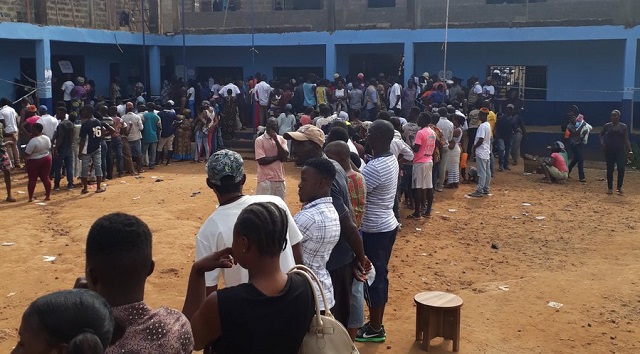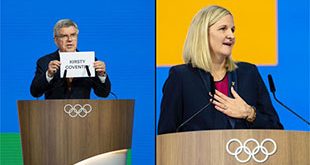
Freetown, Sierra Leone | AFP | Sierra Leoneans voted Wednesday in a general election to pick a new president, with many craving economic change and a boost to living standards in one of the world’s poorest countries.
Dozens of people joined queues at a polling station visited by AFP in the capital, Freetown, as early as 3 am, four hours before the vote kicked off.
First-time voter Joseph Kargbo, 18, said his mother had ordered him to vote for the opposition Sierra Leone People’s Party (SLPP), which has promised free universal education — a key campaign issue.
“I just want to have change in our community and government,” he told AFP.
“My mum can’t pay the school fees, and the SLPP said when they come to power they will make primary and secondary education free,” he added, showing off an index finger marked with ink — proof he had cast his ballot.
President Ernest Bai Koroma, who cannot run again after consecutive five-year terms, has anointed former foreign minister Samura Kamara as his successor for the ruling All Peoples Party (APC).
The export-dependent economy of the mineral-rich but impoverished country is in a dire state following the 2014-16 Ebola crisis and a commodity price slump that has driven away foreign investors.
Mohamed Conteh, chief commissioner of the National Election Commission (NEC), had said Tuesday that electoral authorities were “committed to conduct credible elections.”
More than 3.1 million voters are registered for the polls, which were set to close at 6 pm (1800 GMT). Partial tallies are expected within 48 hours and complete results within two weeks.
Kamara campaigned on continuity rather than change. “I am (Koroma’s) biggest legacy,” he told AFP at the final APC rally on Monday. “I need to sustain what he has achieved… and build on it.”
The SLPP has retained the same candidate, Julius Maada Bio, who lost to Koroma in 2012.
The National Grand Coalition (NGC), headed by former UN diplomat Kandeh Yumkella, is challenging the two-party system by appealing to young and better educated urban voters who are less likely to vote along regional and ethnic lines.
“(Voters) are yearning for real change,” said Julius Spencer, the NGC’s communications chief. “We have been able to draw people from across the religious, ethnic and regional spectrum.”
– Regional divide –
Sierra Leone, battered by a horrific 1991-2002 civil war, is sharply divided along regional lines that overlap with ethnicity.
The APC broadly relies on the Temne and Limba people in its northern strongholds, while the SLPP is more popular in the south with the Mende ethnic group.
“They have huge resources compared to us but we have connected to the people better,” Spencer said.
The Institute for Governance Reform (IGR), a Freetown-based think tank, said in a report that voters were showing a “growing willingness… to consider policy proposals over ethnic considerations.”
Observers from the African Union, Economic Community of West African States (ECOWAS), the European Union and the British Commonwealth are all overseeing voting.
Isolated clashes have been reported between APC and SLPP supporters during the month-long campaign, with minor injuries and material damage.
– Chinese controversy –
Some fear a lack of transport to polling stations in rural areas, as Sierra Leone’s high court this week upheld a ban on private vehicles circulating on election day, citing national security concerns.
The issue of corruption has dominated the campaign, as Bio is accused of stealing $18 million while heading a junta government in 1996 and Kamara is nicknamed “Mr 10 percent” for allegedly skimming his own fee off government contracts.
The current government is accused of misusing funds meant to rebuild the health system after Ebola, and of failing to address the fallout from a mudslide in August that killed hundreds.
Meanwhile, outgoing president Koroma’s increasing reliance on China for infrastructure, including a new airport and adjoining toll road, have raised concerns that Beijing is seeking to keep the APC in power.
“Chinese companies and political officials have bled into the current electoral cycle, shaping public discourse, as well as long-term economic and political decisions,” noted the IGR report.
Voter freebies and funding for campaign materials could “potentially influence the voting public” in the APC’s favour, it added.
 The Independent Uganda: You get the Truth we Pay the Price
The Independent Uganda: You get the Truth we Pay the Price



